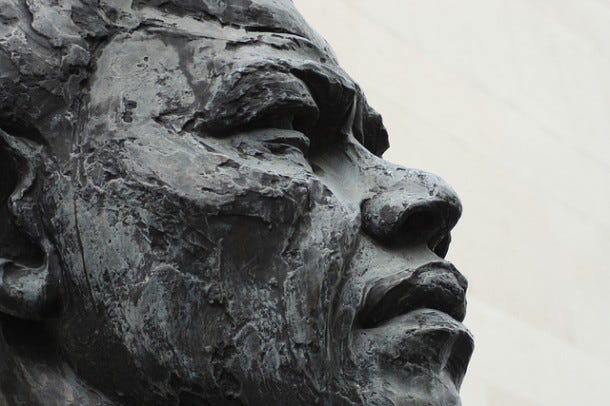Our next Great Leader
In my second and last job interview in 2005, I was asked about my future research ideas. This question never has an easy answer, but for a graduate student applying for his first job, this question was loaded: should I favour one field at the cost of another; should I be specific or instead choose a more general (but vague) topic? I still don't know how (and why!) I came up with the answer: I'd like to know whether Development can be influenced by Great Leaders, I said. I'm still not sure how I got the job.
A new paper by Matthew Andrews of the Harvard Business School, however, shows that my idea was only a decade early. Andrews argues what most economists would agree to: that development (historical change) is not the result of the decisions made by a heroic or charismatic leader, but rather an institutional structure "involving multiple actors who are mobilized to engage in a strategic, synergistic manner":
The essence of this article’s argument is simply that there is a lot more to leadership in development than a focal hero: Heroes often end up being less than heroic; contextual factors shape opportunities for leadership and development; and multi-agent groups typically lead, not solitary heroes. The multiplicity of role players should be obvious when one considers the many ideas about what development demands. There is no way that one man (yes, heroes and benevolent autocrats are usually male) can think up, motivate, implement and institutionalize the many steps required to set up anything like the 2008 Growth Commission’s “right mix of economics, institutions, and politics supporting growth and development.” Leadership of such change, to the broad economic, governmental and political rules of a society, must span different locations, fields and time periods in the life of an emerging country. This leadership must be facilitated by the context and will only emerge when involving multiple actors who are mobilized to engage in a strategic, synergistic manner. The hero orthodoxy fails to account for this complexity, when it is perhaps the fundamental challenge of leading development.
It is an appealing thought that strong leaders can change the course of history. South Africa, in particular, has a rich history of Great Leaders: Shaka Zulu, Paul Kruger, Cecil John Rhodes, Jan Smuts, Hendrik Verwoerd and, of course, Nelson Mandela. There is no doubt that these men had immense influence, for good or bad. But, as Andrews alleges, it is probable that they were more the result of their times than the cause of it. We don't know the counterfactual: had there not been a Verwoerd, would apartheid have existed? Had there not been a Mandela, would a miracle transition have occurred? My answer to both these questions is yes, even though I don't deny the influence these two men had in the shaping of both events.
Now that Madiba is reaching the end of his days, many South Africans yearn for another Great Leader, a man who can lead the people towards a *fill in your preference here* future. One finds such longing for leadership across all cultural groups: it is the reason for Malema's rhetorical appeal, and the Afrikaans song "De La Rey" of a few years ago uttered similar sentiments. Even the newly formed Agang party led by the revered Mamphela Ramphele has created a stir amongst South African voters: could Ramphele perhaps be the answer to South Africa's search for a bipartisan leader? Don't hold your breath. A new political party built on the charisma of one person is exactly what Andrews's paper warns against. Only if Ramphele is exceptionally gifted to, in a very short space of time, sign up "multiple actors who are mobilized to engage in a strategic, synergistic manner" can the party have any hope of success.
More often than not, heroic leaders turn bad. Or, as Andrews puts it, "individuals who may have been considered heroes in the past often turned out less than heroic". Mugabe was initially seen as a hero of the liberation struggle in Zimbabwe (and post-struggle economic reform), only for thousands of Zimbabweans to be killed and hundreds of thousands to flee the country. That is not the record of a Great Leader. Following the volatile years of Idi Amin in Uganda, Yoweri Museveni came to power in 1986 and was soon heralded for his progressive economic policies and dedication to eradicating HIV/Aids. He is still in power and there is mention that his son will take over. His Great Leader credentials are diminishing the longer he stays in power.
Great Leaders don't solve countries' problems. They are solved by building strong institutions and introducing incentives that allow people to prosper. It is, of course, far more difficult to establish the right institutions and incentives than to wait for a Great Leader. But the longer we wait for this next Great Leader, the greater our disappointment will be once he (or she) arrives.
*Image source: Paul Simpson.


